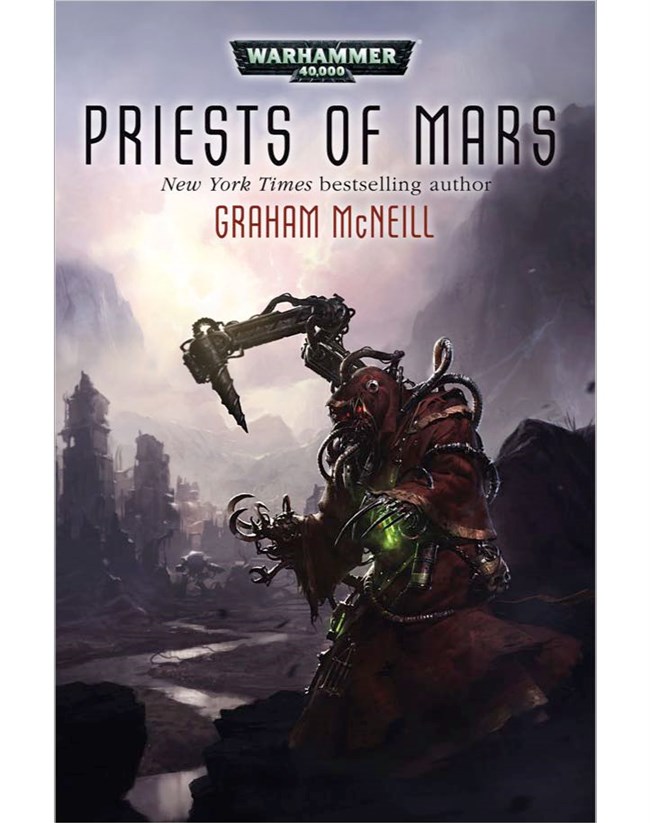Hello, dear and gentle readers, I'd like to preface this review by saying it was my intent to have May be a Steampunk theme month. Well, okay, two steampunk books and a dieselpunk book, but they're closely related! Anyway, I was left with three books that would tie into the theme and four weeks in May. What was I to do? Well, read something from the Warhammer 40,000 universe, of course!
Well, okay, maybe that isn't initially apparent to most people, but I had been hankering to return to the grim darkness of the forty-first millenium and this seemed like as good a choice as any. Priests of Mars follows the adventures of an Adeptus Mechanicus explorator fleet that is planning to travel beyond the known edges of the galaxy in search of lost archeotech. A translation for those of you not versed in 40k lore: A group of guys who worship knowledge and technology are putting a fleet of spaceships together to try and find long-lost technology beyond the edge of the known galaxy. I will say that there's a lot of appeal because the techpriests do not often come to the fore of the 40k books, being strange and mysterious types content to keep to themselves and their machines most of the time. So I was a little excited to get to see the adventures of these guys. In addition, this book is written by experienced 40k author, Graham McNeill, author of the much-lauded Ultramarines books.
Despite these advantages, this book is actually kind of a disappointment for me, and I think the central reason is we spend about half the book getting to know the cast of about twenty or so characters and their various motivations. Ranging from the Archmagos Lexell Kotov, head of the expedition, to Rogue Trader Roboute Surcouf, to Reclusiarch Kul Gilad of the Black Templars Space Marine Chapter, to Abrehem Locke a simple dockworker who gets impressed to labor in the engine rooms of the Speranza, there is a wide range of Imperial viewpoints included in this book. There's even a Titan Legion with its own inner turmoil and the growing insanity of its lead princeps. So while the book establishes a wide cast of characters with conflicting motivations, the result is we never really get to spend a lot of time with any one member of the cast and a handful of cast members actually get less attention than others. The expedition proper doesn't even leave the star system it's starting out from until we're almost halfway through the book, the end result being a lot of time and space spent on meeting a bunch of people before any actual action happens.
Because you have so many characters to keep track of large casts become harder to manage than smaller casts, and there's very few writers who can do it well. It's definitely a marked contrast from McNiell's earlier work with the Ultramarines that focused largely on just Captain Uriel Ventris and the challenges he faced. While those books were engaging and highly readable for me, I just kept finding this book being really, really boring and I think the large cast did not help.
In addition this book did end on a cliffhanger and is continued in Lords of Mars, with a third book planned as well. So it does leave room for the hope that the following two books will help expand and get the action going now that we spent all this time getting to know the cast of characters, but until I read it I really can't say. It does make me think that maybe this would have been better off as one really long book instead of three smaller ones, but only time will tell.
I will say to McNiell's credit he manages to write the weirdness of the Techpriests and Space Marines in a very convincing manner. A lot of the Warhammer 40,000 books I've read focus on the Imperial Guard, who are people more or less like us, just living thousands of years into the future. Space Marines and Techpriests, by contrast, are just inherently different from normal humans and a lot of people find them plain damn weird within the 40k universe. Space Marines are genetically-engineered warriors who have been modified since the cusp of puberty to become the very best of the Emperor's Warriors, steeped in warrior traditions of honor. Space Marines may have only a vague memory of what it is to be afraid or feel pain, at least in the sense that we normal humans feel it. Most regular humans do their best to maintain a respectful distance from the Adeptus Astartes for this very reason. Techpriests are also well beyond what we might consider normal. Their fascination with technology and pursuit of knowledge is understandable enough, but Techpriests also seek to remove practically every element that makes them human as well. Mechanical modification is common, and in fact encouraged, and even the lowest-ranking Techpriests often have hormones and emotion removed from their bodies, resulting in coldly logical beings. Although incredibly necessary to keep the Imperium functioning, Techpriests are just plain damn weird to the majority of other Imperial citizens. McNiell manages to write both the Space Marines and Techpriests as convincingly different from regular humans.
Once things got moving this book was pretty enjoyable. I just hated that it took half the book for it to finally break orbit, both figuratively and literally. I'll probably check out Lords of Mars to see if the adventure gets any better, but this one can probably be safely skipped for now.
- Kalpar


No comments:
Post a Comment